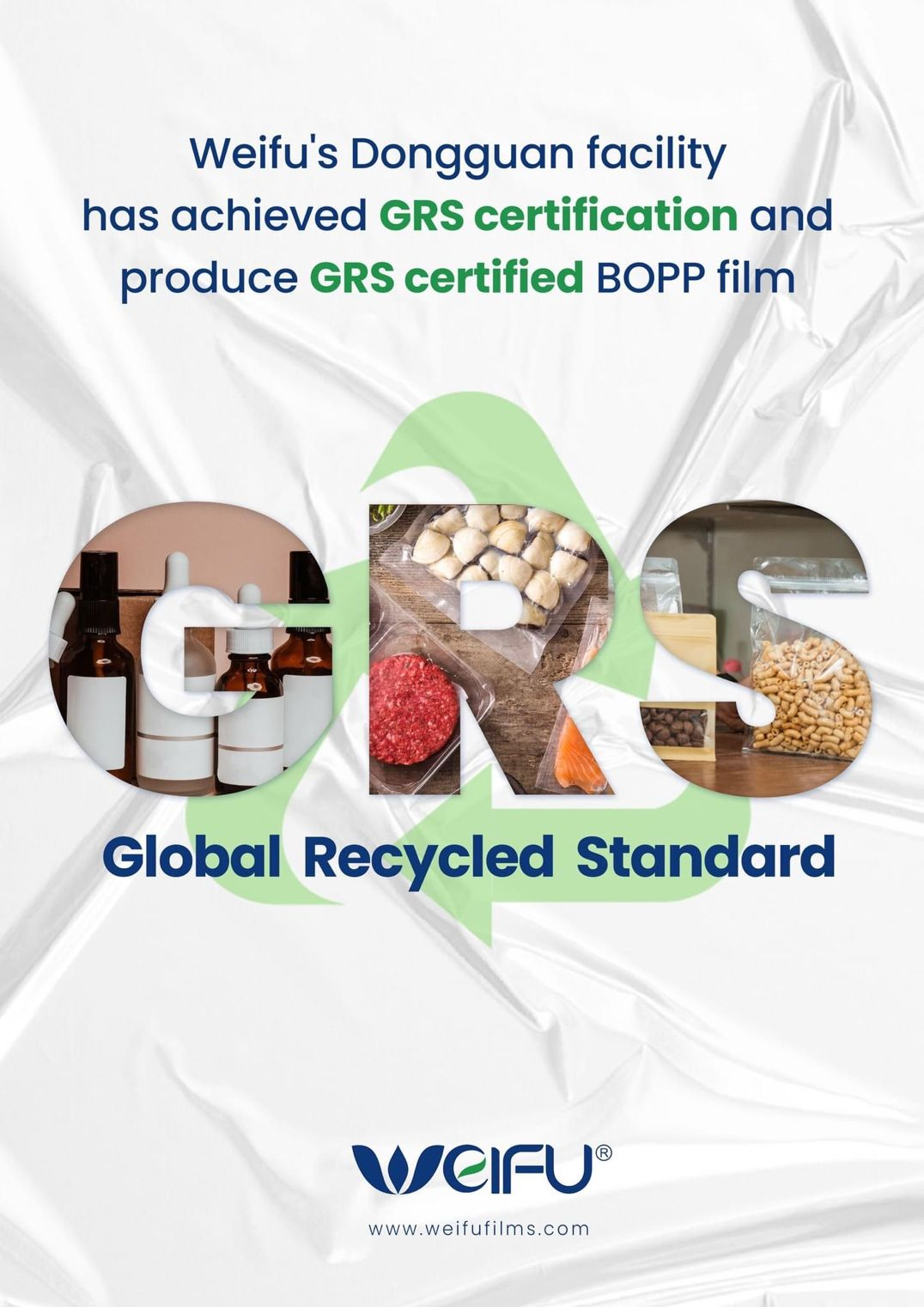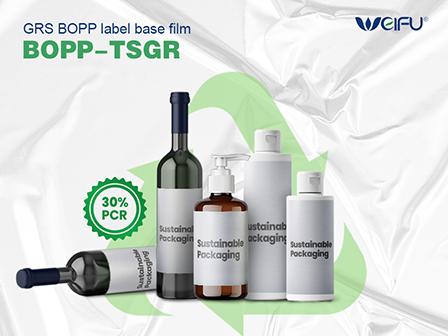2024.01.05
Weifu Develops GRS Certified BOPP Products with PCR Contents
The acceleration of plastic packaging use intensifies waste management challenges. Thus, it propels the demand for post-consumer recycled (PCR) film as a key component in sustainable packaging strategies. PCR material integration faces hurdles like contamination, material degradation, and sorting inefficiencies, which can compromise the quality of the recycled output. Despite these challenges, progressive sorting technologies, including near-infrared (NIR) spectroscopy and improved washing processes, are being developed to increase the purity and viability of PCR plastics and thus bring benefits to PCR films. So, it helps support stringent industry standards for recyclability and sustainability.
Environmental Concerns Associated With BOPP Film
Biaxially Oriented Polypropylene (BOPP) film production is associated with noteworthy environmental concerns. They stem from its petrochemical origin, high energy demand during biaxial orientation, and the emission of volatile organic compounds (VOCs). Moreover, the extensive use of non-renewable resources for polymer synthesis and the challenges in recycling due to multi-layer structures contribute to resource depletion and waste accumulation.
- Impact of BOPP Film on Marine Life, Landfills, and Plastic Pollution
BOPP films' impact on marine ecosystems is notable due to their persistence in the environment. It causes ingestion by marine species, which can cause entanglement, intestinal blockages, and toxicity from associated pollutants. In terrestrial contexts, BOPP prompts the volumetric expansion of landfills and acts as a vector for microplastics as it degrades while exacerbating plastic pollution.
- Concept of Sustainability in the Context of Packaging Materials
Sustainability in packaging needs a shift towards materials and processes that cut environmental footprints. It emphasizes resource efficiency and end-of-life recyclability. In this landscape, PCR film is a key player that supports waste reduction goals. Meanwhile, the Global Recycled Standard (GRS) benchmarks the recycled content, chain of custody, chemical restrictions, and social & environmental practices to promote PCR film as a sustainable alternative in packaging.
Weifu Dongguan Site Has Achieved GRS Certification
The GRS is an international, voluntary, full-product standard. As mentioned earlier, it sets requirements for third-party certification of recycled content, custody chain, social and environmental rehearses, and chemical limitations. The GRS intends to meet the needs of companies seeking to verify their products' recycled content (both finished and intermediate) and to validate responsible social, ecological, and chemical practices in their production. Weifu Dongguan's site has met these rigorous criteria positively. The company incorporates PCR film into its 8.7 million BOPP production line; an example of such product integration is manufacturing sustainable packaging films with verified post-consumer recycled content.
Adding PCR into the BOPP Film Production
Weifu's GRS-certified BOPP film line integrates customized percentage PCR content, typically homing in on a 30% incorporation rate. It decreases reliance on virgin polymers. PCR film is a material derived from plastic products used by consumers and has completed its lifecycle as a consumer item. These are collected, cleaned, and reprocessed to create recycled content for new packaging applications.
In BOPP film production, Weifu includes PCR content while adjusting the production parameters to keep the film's mechanical properties. It verifies that uniformity and quality remain consistent with industry standards. This balance is critical since BOPP films are broadly used in packaging for their tensile strength, smooth surface and moisture barrier properties. The successful integration of PCR upholds these characteristics while promoting the circular economy. It is where materials are reused and recycled to abate waste and environmental impact.
GRS BOPP Films Provided By Weifu
Here, let's introduce you to the most significant GRS BOPP films provided by Weifu.
- GRS BOPP Label Base Film
The GRS BOPP Label Base Film comprises 30% PCR film and guarantees low haze degree and high-performance durability, with its tensile strength registering above industry standards in both machine direction (MD) and transverse direction (TD). Its low thermal shrinkage values render it stable under heat applications. The two-side corona treatment boosts printing and adhesive receptivity for label applications. Furthermore, its compliance with food contact regulations appears to be suitable for various labeling requirements.

- GRS BOPP Plain Film
GRS BOPP Plain Film is unique for its excellent optical properties, validated by a gloss level of over 95% and haze below 2%. It ensures clear and vibrant print results. The film integrates 30% or more PCR content for an eco-friendly packaging solution without compromising quality. Its physical properties are robust, with excellent MD and TD tensile strength, superior dyne retention and good antistatic property that support many post-processing and printing techniques. Suitable for HFFS and VFFS processes, this film is ideal for high-speed packaging operations.
Consider Weifu Sustainable Solutions!
Weifu Films offers sustainable solutions including PCR film in production. The approach helps decrease waste and supports the recycling circular economy. The BOPP GRS films, for instance, include 30% PCR, facilitating global recycling standards and a greener choice for flexible packaging needs. Undoubtedly, these films provide the same high-quality performance and durability as traditional films, which renders them practical for environmentally conscious customers.